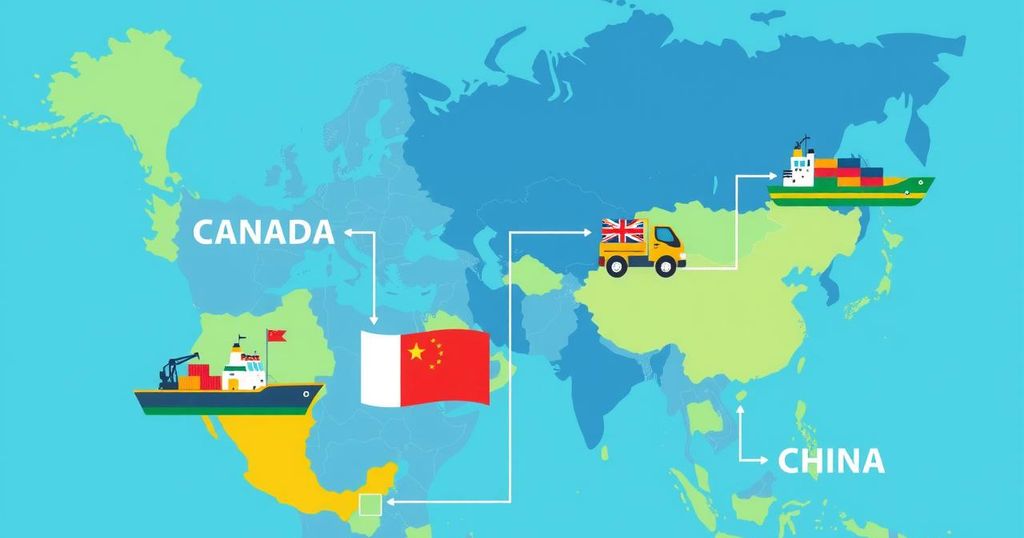Global news
AN, ASIA, BRAZIL, CANADA, CHINA, COMMERCE INDUSTRY, EU, EUROPEAN UNION, GEOPOLITICS, INDIA, INTERNATIONAL RELATIONS, JAISHANKAR, MALAYSIA, MEXICO, MODI, NARENDRA MODI, NORTH AMERICA, OBSERVER RESEARCH FOUNDATION, ORF, PHILIPPINES, SOUTH AMERICA, TARIFFS, TRADE, TRUMP, UNION MINISTER OF COMMERCE AND INDUSTRY, US
Leila Ramsay
0 Comments
Trump’s Tariff Priorities and India’s Position: Insights from Dhruva Jaishankar
Dhruva Jaishankar discusses Trump’s tariff priorities, highlighting Canada, Mexico, China, and the EU, while noting India’s exemption. He mentions ongoing negotiations for interim agreements and emphasizes the significance of the Raisina Dialogue in addressing global issues. Jaishankar also comments on the Russia-Ukraine conflict and the challenges facing the Global South, calling for inclusive reforms and cooperation.
On Monday, Dhruva Jaishankar, Executive Director of the Observer Research Foundation, discussed United States President Donald Trump’s tariff priorities, highlighting Canada, Mexico, China, and the European Union, while noting that India remained somewhat exempt. He suggested that Trump’s announcement of global reciprocal taxes jeopardizes other nations, particularly India, which faces higher tariffs than the U.S. Jaishankar also mentioned discussions between India’s Commerce Minister and the U.S. Trade Representative aimed at reaching an interim trade agreement before April 2.
President Trump’s tariff policies pose challenges for India, as Jaishankar stated that if the U.S. imposes tariffs, India may respond with countermeasures. The hope for an interim agreement reflects ongoing trade negotiations, which could help stabilize U.S.-India relations. Uncertainty remains, but Jaishankar emphasized Trump’s occasional willingness to backtrack, maintaining a cautious optimism for future discussions.
Jaishankar characterized the Raisina Dialogue, commencing on March 17, as an essential global forum attended by representatives from over 100 countries. He highlighted the event’s positive and constructive tone compared to other international conferences. The topics discussed this year encompass connectivity, trade, and significant geopolitical shifts, particularly regarding the Russia-Ukraine conflict.
On the issue of the Russia-Ukraine conflict, Jaishankar noted Ukraine’s agreement to a ceasefire that awaits Russia’s response, indicating the upcoming conversation between Trump and Russian President Vladimir Putin. He elaborated that the crux of the issue lies not only in territorial gains but also in defining Ukraine’s status amid evolving U.S. and European involvement.
Regarding India’s potential role in mediating peace, Jaishankar acknowledged that while Saudi Arabia has taken the lead as an intermediary, India has expressed its willingness to facilitate dialogue if both parties are agreeable. Furthermore, he commented on the ongoing efforts for peace, noting that Russia’s reaction will be critical in the forthcoming days.
Jaishankar highlighted three primary challenges facing the Global South, which are also relevant for India: institutional reform, health and food security, and climate justice. He pointed out that the U.S. has been less involved in addressing these concerns, emphasizing the necessity for more inclusive international dialogue. The implications of the U.S.’s varying engagement levels on the Global South remain uncertain.
In summary, Dhruva Jaishankar’s commentary outlines the key challenges posed by U.S. tariffs impacting India and other nations. As trade discussions advance, there remains hope for agreements that stabilize relations. The Raisina Dialogue serves as a significant platform for global issues, while the Russia-Ukraine ceasefire negotiations illustrate the complexity of international diplomacy. With pressing challenges facing the Global South, proactive engagement from all parties is essential for fostering cooperation.
Original Source: www.business-standard.com




Post Comment